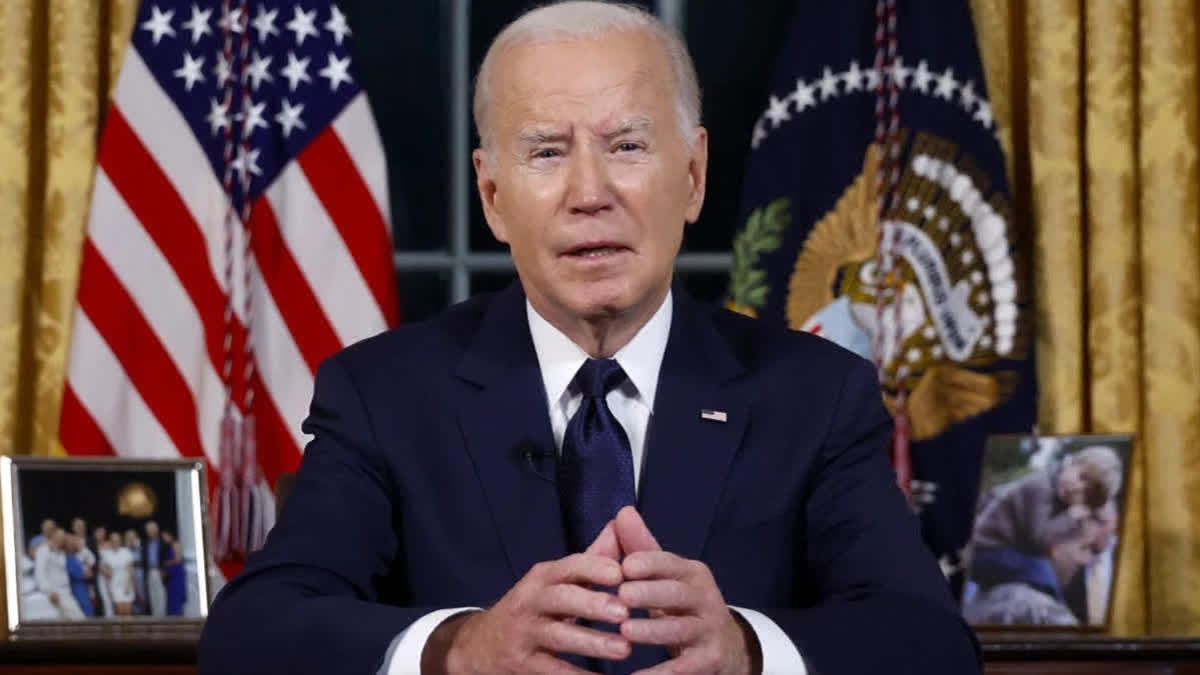Washington:As the 3-week-old Israel-Hamas war enters what Israeli Prime Minister Benjamin Netanyahu says could be a long and difficult new stage, President Joe Biden is calling on Israeli and Arab leaders to think hard about their eventual postwar reality. It's one, he argues, where finally finding agreement on a long-sought two-state solution to the Israel-Palestinian conflict should be a priority.
There's no going back to the status quo as it stood on October 6, Biden told reporters, referring to the day before Hamas militants attacked Israel and set off the latest war. The White House says Biden conveyed the same message directly to Netanyahu during a telephone call this past week. It also means that when this crisis is over, there has to be a vision of what comes next, and in our view it has to be a two-state solution, Biden said.
The push for a two-state solution one in which Israel would co-exist with an independent Palestinian state has eluded US presidents and Middle East diplomats for decades. It's been put on the back burner since the last American-led effort at peace talks collapsed in 2014 amid disagreements on Israeli settlements, the release of Palestinian prisoners and other issues.
Palestinian statehood is something that Biden rarely addressed in the early going of his administration. During his visit to the West Bank last year, Biden said the ground is not ripe for new attempts to reach a permanent peace even as he reiterated to Palestinians the long-held US support for statehood.
Now, at a moment of heightened concern that the Israel-Hamas war could spiral into a broader regional conflict, Biden has begun to emphasize that once the bombing and shooting stop, working toward a Palestinian state should no longer be ignored. Until recently, Biden had put far more emphasis on what his administration saw as the achievable ambition of normalising relations between Israel and its Arab neighbours than on restarting peace talks.
Even his national security adviser, Jake Sullivan, in a lengthy essay that was written shortly before the October 7 attack and described Biden's global foreign policy efforts made no mention of Palestinian statehood. In an updated version of the Foreign Affairs essay posted online, Sullivan wrote that the administration was committed to a two-state solution".
White House official also say the normalisation talks have always included significant proposals to benefit the Palestinians. There is no shortage of obstacles in the way of Biden's postwar vision. An independent Palestinian state in the West Bank and Gaza is viewed as a nonstarter by Israel's far-right government. An ineffectual Palestinian Authority controls the West Bank and has little credibility with the population it governs.
Meantime, a looming US presidential election could make Biden a less-than-ideal mediator in 2024. Aaron David Miller, who served as an adviser on Middle East issues to Democratic and Republican administrations, said Biden's recent emphasis on a two-state solution was an aspirational talking point". The odds are very, very low, he said. It's essentially mission impossible.
The call for a two-state solution arose Saturday at the Republican Jewish Coalition summit in Las Vegas, where GOP presidential contenders criticised Biden's Israel policy and what they saw as a failure by Democrats to sufficiently condemn antisemitism across the United States. One presidential hopeful, biotech entrepreneur Vivek Ramaswamy, said Israel should feel free to abandon the myth of a two-state solution".
The White House is cognizant that Biden's calls for a two-state solution are ambitious and are perhaps not achievable in the near term, according to a White House official who was not authorised to publicly discuss internal deliberations and spoke on condition of anonymity. There is also a recognition that the Netanyahu government, facing public backlash for failing to prevent the Hamas attack, is focused on its operations against Hamas and is not giving much consideration to Biden's talk of Palestinian statehood.
